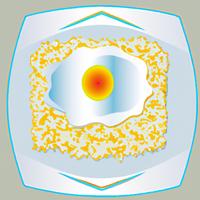
1 serving (200 grams) contains 300 calories, 12.0 grams of protein, 10.0 grams of fat, and 40.0 grams of carbohydrates.

Log this food in SnapCalorie

Nutrition Information
Calories |
352.9 | ||
|---|---|---|---|
% Daily Value* |
|||
| Total Fat | 11.8 g | 15% | |
| Saturated Fat | 3.5 g | 17% | |
| Polyunsaturated Fat | 0 g | ||
| Cholesterol | 176.5 mg | 58% | |
| Sodium | 235.3 mg | 10% | |
| Total Carbohydrates | 47.1 g | 17% | |
| Dietary Fiber | 1.2 g | 4% | |
| Sugars | 1.2 g | ||
| protein | 14.1 g | 28% | |
| Vitamin D | 47.1 mcg | 235% | |
| Calcium | 58.8 mg | 4% | |
| Iron | 2.4 mg | 13% | |
| Potassium | 176.5 mg | 3% | |
* Percent Daily Values are based on a 2,000 calorie diet. Your daily values may be higher or lower depending on your calorie needs.
Food Attributes
Source of Calories
About Rice with eggs
Rice with eggs is a simple, versatile dish found in many global cuisines, including Asian, Latin American, and Mediterranean traditions. Typically, it consists of steamed or fried rice paired with eggs, which may be scrambled, fried, or poached, and often includes additions like soy sauce, scallions, or vegetables to enhance flavor. As a balanced combination of protein from the eggs and carbohydrates from the rice, it provides sustained energy, making it a popular comfort food. Eggs are a rich source of high-quality protein, healthy fats, and essential vitamins like B12 and D, while rice can vary in nutritional value depending on the type; brown rice adds fiber and nutrients, while white rice is less nutrient-dense. However, the dish’s healthiness can be affected by excess oil, salt, or added toppings. Overall, rice with eggs is a nourishing, affordable staple that adapts easily to various dietary preferences.



